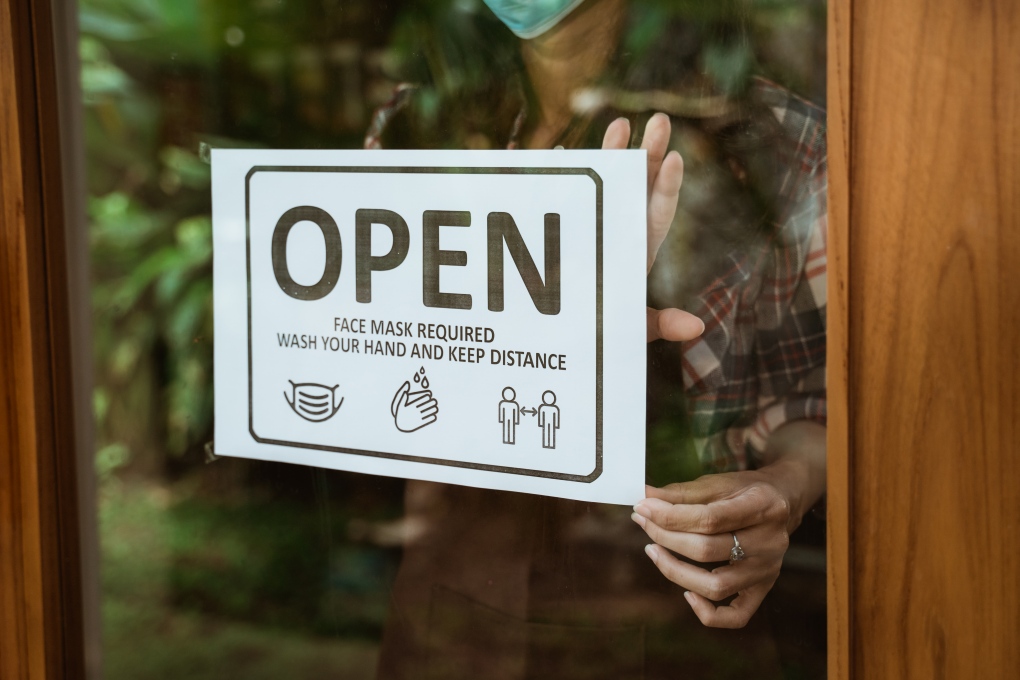B.C. human rights complaint against Lululemon over masks dismissed
 Mask sign seen inside a business. (Shutterstock)
Mask sign seen inside a business. (Shutterstock)
A human rights complaint filed against Lululemon Athletica over its COVID-19 mask policy has been dismissed by a B.C. tribunal.
The complainant, Yvonne Coelho, claimed she was discriminated against when she was told last November she couldn't shop inside without wearing a mask.
She told the employees she had a "medical exemption," but was advised she could only shop outside or online, according to the B.C. Human Rights Tribunal's decision, which was posted online last week. Lululemon denied discriminating against the Coelho and requested to have the complaint dismissed.
At the time, B.C. hadn't yet implemented its mask mandate for indoor public spaces. However, Lululemon implemented its own policy requiring masks for employees and shoppers in late July. Staff members were told they could offer customers three alternatives: buying online with pick-up at the store, online shopping with delivery or having an employee get the product and complete payment at the door.
The tribunal heard that Coelho refused those options during the Nov. 20, 2020, incident, and instead argued with a manager that she should be allowed to enter without a mask due to her condition.
"When the manager continued to insist, Ms. Coelho asked for the basis on which she was being asked to leave, noting 'it’s your store policy, it’s not the law,'" tribunal member Emily Ohler wrote in her decision.
"When asked to either put on a mask or leave, Ms. Coelho said, 'Um, so, I don’t wanna leave.' When offered the opportunity to shop online or outside, Ms. Coelho said, 'no, because that’s discriminatory. It’s against the Charter of Rights and Freedoms.'"
That complainant told the tribunal her condition poses an increased risk of panic attacks and anxiety attacks as a result of claustrophobia, according to the decision. Coehlo presented a medical note from a naturopathic doctor purporting to grant her an exemption.
PROOF OF ADVERSE IMPACT
Nine days after Coelho visited the store, B.C. implemented a mandatory mask policy for all indoor public spaces. Ohler's decision pointed out that Coelho used the public health order's "language of 'exemption," which wasn't in place at the time of the incident.
"The use of the word 'exemption' in public health orders seems to have created some confusion," Ohler's decision said.
"The public health orders do not change the fundamentals of how human rights protections operate under the (Human Rights Code)."
Ohler found Coelho had failed to demonstrate she experienced an adverse impact due to the incident, and noted that Lululemon had offered her several other shopping options, which Coelho refused.
"Ms. Coelho is seeking her perfect accommodation – to shop freely in‐person at Lululemon’s stores without having to wear a mask, at a time when the province had declared a state of emergency over a respiratory virus about which little was yet known," the decision said.
"Ms. Coelho chose to simply leave the store rather than explore the accommodation options that Lululemon immediately put forward. This alone would support a finding that Ms. Coelho herself thwarted the accommodation process in all the circumstances."
A similar human rights complaint decision was also published last week, after a person shopping at a pet food store was denied entry for not wearing a mask. In that situation, Ohler also determined the shopper was offered adequate accommodation.
"If a complainant establishes that they experienced a disability‐related adverse impact – such as not being able to wear a mask and being barred from entering premises as a result – this does not then entitle the complainant to simply do what they please," Ohler wrote.
"Rather, it requires the respondent to reasonably accommodate the complainant to try to mitigate that barrier."
CTVNews.ca Top Stories

Canada could impose tariffs on U.S. steel, orange juice in response to Trump threat
Canadian officials are narrowing a list of American products to target in the event the federal government must respond to U.S. tariffs on Canadian goods, CTV News has confirmed.
Convicted Jan. 6 rioter arrested as fugitive in Whistler, B.C.
An American citizen convicted of participating in the Jan. 6, 2021, riot on Capitol Hill who said he was seeking asylum in Canada has been arrested as a "fugitive from U.S. justice," according to authorities.
Can the U.S. really make Canada the 51st state?
Talk of Canada becoming the 51st American state has raised an existential question on this side of the border: Could it be done? Could the maple leaf make way to the stars and stripes? According to several experts, it may be possible, but not painless.
L.A. wildfires continue to devastate area, Canada prepared to offer expertise
A series of wildfires are searing through the Los Angeles area, forcing many to evacuate their homes. Here's everything that happened throughout Jan. 8.
'True when I said it, true today': former Canadian PM Harper pushes back against Trump on social media
Former Canadian Prime Minister Stephen Harper doesn’t find president-elect Donald Trump’s jibes about Canada becoming the 51st U.S. state very amusing.
Ontario Premier Doug Ford says he is 'OK' after OPP vehicle he was in was 'sideswiped' in Highway 401 collision
Ontario Premier Doug Ford was uninjured after an OPP vehicle he was travelling in was involved in a collision on Highway 401 earlier today.
At least 60 University of Guelph students sick as 'cluster of illness' hits residence
The University of Guelph is dealing with what they are calling a ‘cluster of illness’ among students living in residence.
Energy minister 'committed' to consumer carbon tax as he considers Liberal leadership
Energy and Natural Resources Minister Jonathan Wilkinson says he would be 'committed' to the consumer carbon tax should he become Liberal leader and prime minister, despite the policy’s unpopularity.
New ranking suggests Canada passport among 'top 5 losers' in the world
A new global ranking may raise doubts about Canada's reputation of being open to other countries.
































